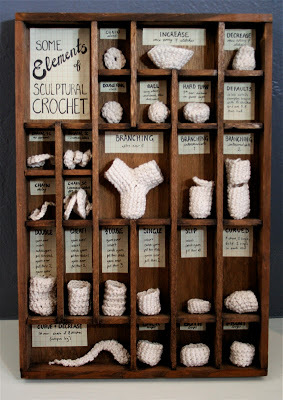e-Learning Ecologies MOOC’s Updates
Maker Spaces and the Mr. Miyagi effect
The new global economy values, more than ever, a “rounded” education. Specialization is becoming obsolete and the workers of the future will need to navigate a complex web of qualifications and prerequisites.
Professor and Maker Space advocate John Spencer said:
There was a time when you could … climb a corporate ladder. But because of the complex global economy… our students are going to have to navigate a maze. The ladder is now a maze.
Maker Spaces are too often thought of as focused on Computer Science or Robotics. One definition of Maker Space is:
A space designed and dedicated to hands-on creativity
It is important for this emphasis to be put front-and-center in order for Maker Spaces to thrive. They must embrace many different ways to learn and express creativity.
I’ve crocheted as a hobby for over 20 years. Before Pinterest, I rarely had people to share my hobby with until I attended the Maker Faire in 2015. This Maker Space inspired me to take my hobby to the next level.
In COVID times, young students are faced with more downtime than ever before. This is likely to be filled with YouTube and Fortnite. The encouragement of Maker Spaces in every home is a solution to this. Students can be encouraged to learn a creative hobby, from painting to crochet to beekeeping. Learning any new discipline expands student’s capacity for ingesting new information and broadens their educational horizons.
Will Holman, who manages a Maker Space in Baltimore, said:
To realize their potential and become the centers of a new cottage industrial revolution, makerspaces will need to adopt a more holistic approach
Young students, and sometimes teachers, often don’t realize a hobby like crochet can help learn a more technical discipline like Software Development.
Crochet is often broken down into steps:
Determining requirements for the final product
Choosing a pattern
Learning the pattern
Learning any crochet you’re not yet familiar with
Following the pattern closely
In this process the word “pattern” can be swapped with “algorithm”, and “crochet” swapped with “language” or “robotics” and the same process applies.
Thus, Maker Spaces are, directly or indirectly, effective teaching technical skills without the students knowledge.
A Maker Space is similar to Mr. Miyagi telling Daniel-San to sand the floor, paint the fence, wax on. Daniel thinks he’s doing chores, but then, in a sudden flash of inspiration, Mr. Miyagi shows Daniel that he’s been learning the basic tenets of Karate all along. I hope Maker Spaces can act as a Mr. Miyagi to a new generation of learners.
References
https://www.cultofpedagogy.com/makerspace/
https://placesjournal.org/article/makerspace-towards-a-new-civic-infrastructure/?gclid=EAIaIQobChMIx4iczqXN6wIVNAnnCh236ANyEAAYASAAEgK6fvD_BwE&cn-reloaded=1



I can relate to this absolutely well! By learning piano I got better at math, and by playing videogames I got better eye-hand coordination, learned languages, and movies taught me many bases for great skills like mechanics and biology (and gave me the push to question what I know and follow the scientific method).
Most of these things I only realized later on, just like when Miyagi attacks Daniel, who defends himself almost automatically. This proof of skill part is very important, and this brings me to two things I really miss seeing:
1. A clear discipline of study that maps (or tries to map) every single skill and knowledge involved in any hobby, action, or situation of everyday's life;
2. What types of proof of skill would be good to use for each individual student with specific backgrounds and needs (not everybody is Daniel-san, and they might have given up much earlier, just vanished, or offended by Miyagi's attacks)
I see this as a teaching arsenal that still has to begin to be developed, and of course, learned by present and future teachers, because knowing how to do this is a skill that many people perceive and think about, but few have ever got under the surface.